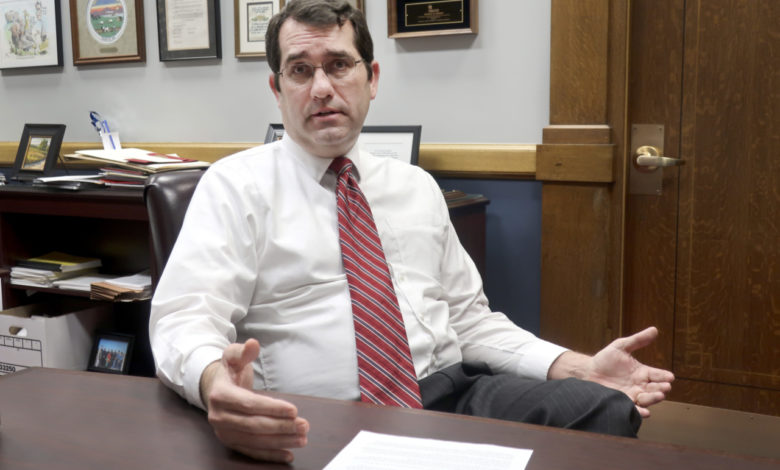Attorney General Derek Shmidt on how to protect yourself against car scams

Car scams are rampant with all the shortages going on. Purchasing a new or used vehicle has become more difficult in recent years. Whether it is the in-person shopping limitations brought on by the pandemic, supply-chain disruptions that have limited the production of new vehicles, or the shortage of available used vehicles, Kansans have had to endure a great deal just to find reliable transportation.
Attorney General Derek Shmidt warns us of these classic dealership scams.
Yo-yo scams: A yo-yo scam occurs when a consumer is led to believe, through acts or omissions by a car dealer providing financing, that the loan financing is final when in fact the dealer has not actually finalized the vehicle financing. The dealer allows the consumer to drive off the lot with the car “on the spot,” which is called a “spot delivery” in the auto sales industry. The dealer knows the consumer has not qualified for financing, and sometimes the dealer knows the consumer is not going to qualify. When the financing falls through, the dealer pulls the consumer back to the dealership like a yo-yo on a string. Sometimes the dealer presents a new deal to the consumer to allow them to keep their car – one with a higher interest rate or larger down payment. The frequent excuse is “the lender” has disapproved the application or has changed its mind. Consumers can protect themselves by comparing financing offers from several lenders before shopping for a vehicle, and securing financing before shopping. If consumers choose to finance with the dealer, ask if the deal is final and get that assurance in writing before taking the vehicle home.
Auto add-ons: Add-ons are not free. They are extra things consumers buy and finance along with the vehicle. Common add-ons include gap insurance policies, extended warranties and service contracts. It is OK to say no to add-ons, and to ask what they cost. It is not OK for dealers to tuck add-ons into the deal without the consumer’s consent or knowledge. Consumers should know exactly what they are buying. We recommend asking the dealer to list the price of any proposed add-on before you arrive at the dealership, so you can see the total cost of the car. Consumers who finance should ask the lender to figure how much the add-ons cost over the life of the loan. Consumers should ask about any limits or conditions the warranties and service contracts may have. They do not always cover what consumers expect. Consumers should feel comfortable saying no to add-ons they do not want, do not need, or do not want to pay for. If you don’t want or need it, say no.
Excessive administrative fees: In addition to understanding add-ons, consumers should be aware of what they are paying in administrative fees. There are three typical new car fees: the vehicle registration fee, the sales tax, and the documentation fee. The vehicle registration fee is the amount the state charges to register the vehicle, assign a title to a new vehicle, and cover the cost of license plates. If the dealer provides the service, it saves the consumer a trip to the county tag office. Sales tax on a vehicle includes tax at the state rate, and tax at the county, or even municipality rate. Dealerships charge a documentation fee to cover costs of preparing and filing the contract and other paperwork involved in the sale. Consumers should do their homework. Many counties publish registration charges on their websites. You can look up your local sales tax rate on the Kansas Department of Revenue website at https://www.ksrevenue.gov/atrladdress.html. By using a local address and purchase amount, a consumer can calculate the expected sales tax. Similarly, consumers can research the average documentation fee for their area, and be prepared to discuss the fee amount with the dealer. Some dealers write additional fees into the contract and give them official-sounding names, like “PDI” or “dealer prep.” Consumers should find out early what fees the dealer charges, and negotiate the price of the vehicle accordingly. Sometimes just telling the dealer the consumer knows the fee is unusual will spur the dealer to remove or reduce it.
Market adjustment fee: A common occurrence in 2022 is a “market adjustment fee.” Dealerships charge this fee when they consider the type of vehicle to be in short supply, so the dealership raises the price to make more profit. A market adjustment fee can be $1,000 to $5,000 or more, depending on the make and model of the vehicle. The dealer should advertise this fee with the price of the car to make consumers aware of the amount the dealer plans to charge. Consumers don’t have to pay this fee, but a dealer also is not required to sell a vehicle at the Manufacturer Suggested Retail Price. The amount of this fee will differ based on dealership, and there are a number of dealerships that do not charge this fee. Consumers should ask if a vehicle has been “marked up” before visiting a dealership, and be willing to expand the search for a vehicle to get the deal they consider reasonable.



